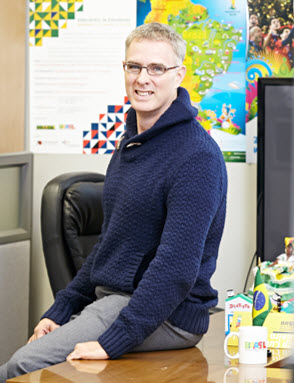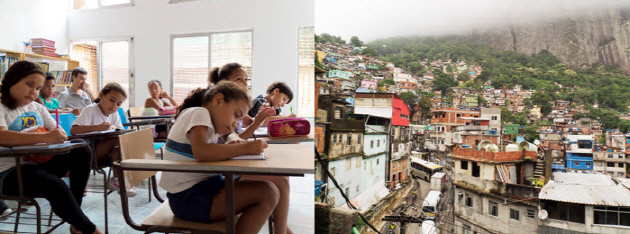
Professor Paul Sneed
From the recent Nepal fund raising events, volunteers going to Vietnam by the Institute for Global Social Responsibility, to academic research projects, SNU has had a long tradition of working in developing countries. It is not surprising that Professor Paul Sneed, a practitioner of knowledge who believes in the power of community, embraced SNU as his current home for engendering Brazilian studies and local service.
As the first appointed professor in the field of Brazilian Literature and Culture at SNU, Professor Sneed is notable for his passion in combining his scholarly and social work. He has previously taught Spanish and Portuguese at the University of Wisconsin-Madison, University of Oklahoma, University of Kansas, and San Diego State University. Before coming to SNU, he was the Director of Development at Brazil’s Amazon Valley Academy. At SNU, he teaches “Brazil’s Culture and Society,” and “Latin American Culture and Society.”
The Two Brothers Foundation
What makes him special is that he is engaged in social work. Bring something unique to SNU which is not only academics but deep engagement with social work. Professor Sneed was a founding member of the non-profit volunteer organization, the Two Brothers Foundation, in 1998.
The Two Brothers Foundation aims to create educational communities in Brazil by bringing together a diverse group of people in teaching and learning languages, arts, and sciences. Their mission is to provide educational opportunities, strengthen community service, and foster international exchange, specifically in the favela Rocinha.

Students in the classroom of Two Brothers Foundation and Rocinha village
For more than sixteen years, Professor Sneed has been working for the organization, helping it grow and develop into an “organic university.” Professor Sneed explains that it is “a university in the sense that it brings together researchers, students, and people from all different social classes, ethnicities, and nationalities, along with local folks from the favela for mutual learning in the spirit of friendship.” Nowadays, Professor Sneed engages in administrative work for the organization.
The focus on language and basic subjects’ education is important because Brazil’s public school system faces many challenges, and students in the favelas lack access to learning English. Acquiring English is an important source of information and a gateway to university and jobs, so “teaching was a way to break down the divided linguistic accessibility, but a lot of what happens through school is the friendships that form around it.”
Such community type learning could be positive for Brazil because of its historical difficulties that make more room for the relational kind of knowledge. Influenced by the theologian Martin Buber, Professor Sneed’s philosophy is about the role of “alternative spaces where people are coming together” in producing and disseminating knowledge.
Friendships and Communities
The friendships that Professor Sneed formed in Brazil are essentially what made him stay in Brazil. Ever since his first encounter with Brazil, Professor Sneed recognized the uniqueness of Brazil’s community culture, and believes in its key role as the hope for a better society, and the factor that makes Brazil an attractive nation.
The journey began when Professor Sneed travelled around Brazil, looking for an interesting research topic for his undergraduate thesis. He found a topic on the organized drug crimes and drug gangs, and decided to live in the favela Rocinha.
“That initial study abroad and the component of living in a poor community with amazingly nice people, who took really good care of me and taught me so much about life and befriended me, was a life-changing experience. I sort of fell in love with Brazil. From the very first time I went to Brazil, I felt like I connected very well with the people.”
The unforgettable experience with living in the favelas motivated Professor Sneed to further emerge himself in Portuguese studies. After graduating University, he returned to the favela Rocinha to live there for four more years.
For his doctoral dissertation, he wrote about how the representation and power of the Brazilian drug gangs are mediated through the musical culture of Brazilian gangster rap. It was during this time, that he developed a strong interest in social work. His two interests complemented one another. Sneed believes that “to have an active participation with the local people on a daily basis had a positive impact on my research and my role as a community educator.”
But most of all, along the way of obtaining his PhD in Portuguese, he met his wife, who is Brazilian. He shyly reveals that “I deepened my connection to brazil real personally too.”
Teaching Community Spirit at SNU
Inside the classroom of “Brazil’s Culture and Society,” students in small groups of four are actively discussing about the communities they are involved in. They just watched a documentary directed by Professor Sneed on the communities in the favela Rocinha. This kind of discussion on comparing communities and analyzing the bottom-up approach of documentaries are among his teaching methods.
Students also discover his teachings to be original and inspirational. SEO Min-kyo (Graduate School of Economics, 15) remarked that he found his teachings well-balanced. “They had ‘micro-foundations,’ on which ‘macro-level’ discourses about Brazilian culture were based on. He tried to show us the actual world people are living in, which this kind of a course often forgets to tell.”
Through his classes, Professor Sneed wishes to “allow people to make some of their own conclusions and seek further studies and apply those in ways that are interesting to them.”
Professor Sneed describes that there is a well-established tradition of Hispanic and Latin American Studies in Korea, but anybody who is teaching in those areas is still a pioneer. In addition to engendering community based learnings, Professor Sneed views SNU as a “place that [he] can serve,” not only in promoting humanities as an academic discipline, but as something that is a part of our lives.
Written by BAE Su Hyen, SNU English Editor, suhyenbae@snu.ac.kr
Reviewed by Eli Park Sorensen, SNU Professor of Liberal Studies, eps7257@snu.ac.kr

